- Home
- Gaston Leroux
Rouletabille at Krupp's Page 4
Rouletabille at Krupp's Read online
Page 4
“There was nothing he did not know about the most secret mechanism of the Titania?”
“Nothing, Monsieur.”
“Even though your husband had judged it prudent not to reveal it to Mr. Cromer, his assistant knew it?”
“Yes, Monsieur, he knew everything.”
“That’s categorical,” observed Horn-rimmed Glasses to the other VIPs. “The Pole knew everything, and he can do everything.”
There was a pause, and then the President resumed: “In order for you to affirm, Madame, in such a clear fashion, that the man is incapable of abusing the secrets he possesses, you must undoubtedly believe that he is entirely devoted to France, or at least to the Allies’ cause?”
“No, Monsieur no—it’s not for any patriotic reason that I believe him to be incapable of infamy. If I’ve said that, it’s because I know his character and his love for my daughter.”
At this point the head of the Sûreté Générale asked for permission to ask a question.
“Did you know, Madame, that Serge Rejitsky is not the real name of Mademoiselle Fulbert’s fiancé?”
“We knew that, Monsieur. His real name is Serge Kaniewsky, and under that name he has been pursued in Poland and in Russia, and arrested in France and put on trial with a group of anarchists. He was sentenced to five years in prison, even though nothing precise was proven against him.”
“In brief,” the head of the Sûreté Générale put in, “he’s a man who has suffered a great deal, and who believes that he has been unjustly condemned by France. He’s a man who can’t have any great love for France.”
“That’s possible, Monsieur, but my daughter loves France, and you can be sure that her Serge will act as if he felt the same, for in that respect, Serge knows full well that my daughter would not forgive him for any weakness, let alone treason. For Serge, I repeat, there is no longer anyone in the world but my daughter. He arrived in our home, dying of hunger, proscribed by all the police forces on earth, with formidable ideas of vengeance against the human race—the man had never known anything but hatred. He was ugly, morally and physically. Physically, you hear, Messieurs—very ugly rather than simply ugly. It was sufficient for my daughter to lean over that wreck…and another man was born. Now, Serge knows that he is loved, for my daughter loves him, because of his fiery soul, akin to her own. Now, Serge knows love! The rest—the past, he present, the future, outside of that love—no longer exists. He would blow up the world for a smile from my daughter; he would refrain from killing a fly in order not to give her grief. You can be tranquil, Messieurs, quite tranquil...”
And the benevolent old lady, shaking her head, seemed to want to reassure everyone.
The gentlemen thanked her, and addressed a few more kind words to her. The head of the Sûreté Générale escorted her as far as the vestibule.
When he came back, the gentlemen were all in agreement in proclaiming that, far from tranquilizing them, what the old lady had said had increased their anxiety considerably.
“My opinion,” declared the editor of L’Époque, squarely, “is that we now have everything to fear!”
“In any case,” said Horn-rimmed Glasses, “we ought to act as if we had everything to fear.”
“And act without losing a minute!” added the Tobacconist.
“Have Nourry come in!” ordered the President.
Immediately, silence was reestablished. The head of the Sûreté Générale opened a door that connected with a small private room, and a man was shown in.
Chapter VI
Nourry
He was still young, with a very intelligent face, and seemed to have suffered a great deal physically. He had an arm in a sling. He was dressed in the rather unorthodox costume of a convalescent poilu. He was invited to sit down.
The head of the Sûreté Générale said to him: “Nourry, you’re going to tell us everything that happened to you in Essen since the day when you met Malet, and then how you both escaped, and how Malet was killed at the Dutch frontier.”
The mean began immediately. “Messieurs, I was taken prisoner at Yser. I was immediately taken to the camp at Rastatt. I had only been there a week when I was asked whether I might like to work in my profession at Essen, for Krupp’s.
“I’m a graduate of the École des Arts et Métiers. For five years I was at the head of a major cutlery business in Guéret. The Boche had learned these details from my papers. I replied to them: ‘If it’s to manufacture bayonets or work on munitions, there’s nothing doing.’ They said to me: ‘No, it’s to make scissors, women’s scissors for sewing.’ I thought they were having me on, but I said to myself: it’s always as well to take a look, and I replied: ‘Okay!’
“And I arrived in Essen. As well as the factories, there are prisoner-of-war camps there. The majority of the prisoners had simply been requisitioned to work on the roads, but there were a few hundred who were taken out of the camp into the morning to work in the factories, from which they were brought back in the evening. They weren’t required to work on munitions. It’s an error to believe, as I’d believed for a long time myself, that the factories at Essen only make cannon, shells, armor and other war materials; in fact, a fairly large section of the workshops produces articles of very various sorts, intended to be exchanged for foodstuffs or other basic necessities n neutral countries.
“I’ve seen products made at Essen heaped up on the docks of the Ruhr, at Duisburg—machines and machine components-that were about to leave for Sweden, sent there in exchange for oil, fish, paper and wood. The Krupp factories send knives, scissors, sewing-machines and utensils of every sort to Holland. In particular, al the French prisoners who had been employed before the war in manufacturing sewing-machines are sure of receiving an offer to work at Essen. If they accept, they’re treated well, and even receive a reasonable wage. If they refused, they’re only making things more miserable for themselves.
“It wasn’t in the workshops that I met Malet but in the camp, one evening, while having a glass of beer in the canteen. He wasn’t working in the steel mill, but in the radiology section. For months, he’d been employed in the manufacture of military radiological vehicles; that was his specialty. When they found out that he’d worked before the war in Professor Laval’s laboratory at the Sorbonne, they sent him to the Energy Laboratory which the chief engineer of inventions had recently created in the huge Research Center.
“More than once, Malet told me that, in his opinion, it wasn’t always with the objective of healing injuries that certain experiments with radium were being carried out in the Energy Laboratory. At any rate, it was there that Malet was surprised to see, one day, a familiar face: that of the inventor Théodore Fulbert. What was he doing there? How had he come to be taken prisoner? Malet asked himself that for some time without being able to find an answer.
“Fulbert was closely watched. He only went through the laboratory to be locked up in a small work-room specially reserved for him—but one day, Fulbert spotted Malet and recognized him. He made him a sign indicating that he needed to speak to him. A week later I saw Malet arrive in the canteen very pale, quite incapable of hiding his emotion. ‘Let’s take a walk,’ he said to me—and he led me very gently, without seeming to be doing anything in particular, to the Kullmann bakery situated in the north-western corner of the camp. We were served coffee and liqueurs there, clandestinely, in the back room. Frau Kullmann let us in there quite often, because we paid well for those few minutes of solitude. Indeed, she closed the door on us, and that was the only moment of the day when the Boche could no longer see us. It was much appreciated.
“The back room had a window with overlooked the northern section of the factories. For some time, through that window, we had seen an enormous wooden building being constructed on the causeway inside the surrounding wall, whose length we couldn’t even measure, because it was hidden from us by other buildings and the accumulation of temporary shops that had been constructed since the war.
“The building had the peculiarity that it wasn’t constructed in alignment with the others, nor parallel to them; it was orientated obliquely, north-east to south-west, as if positioned across, and cutting through, all the rest—and because of that, a number of workshops had been demolished.
“If it hadn’t been absurd to imagine that such an impracticable location had been chosen for landing dirigibles, we might have been able to believe that they were in the process of constructing some sort of Zeppelin hangar. In the same way, had the building been erected on the sea shore, we could have believed that it was to serve for the construction of the largest ship in the world. Malet and I had, therefore, been very intrigued by the vision of that fantastic edifice, all the more bizarre because its roof was much higher at the southern end than the northern end.
“That day, as soon as we were alone in the back room of the bakery, Malet drew me to the window, pointed to the gigantic framework and said: ‘Everything we’ve imagined is short of the truth. Do you know what they’re going to build in there? An almighty torpedo designed to reduce Paris to ashes in a matter of minutes!’
“I couldn’t help shrugging my shoulders at first, so far did the project seem to surpass the limits of human possibility—but Malet wasn’t a child. He was, moreover, a scientist; and as he spoke, I was attained in my turn by the most somber fear...
“He told me that he had managed, without being seen, to get into Fulbert’s private workroom for a few minutes. It was there that the inventor had told him about the terrible adventure that had undergone.
He and his daughter, and his daughter’s fiancé, the Pole Serge Kaniewsky, of whom there was so much talk during the trial of the anarchists, had been taken prisoner by the Boche on the English coast while all three of them were in the process of carrying out trials, on a reduced scale, of a prodigious machine capable of destroying a city at an enormous distance. At the same time as they had abducted the inventors and taken them aboard a submarine, the well-informed Boche had also stolen all the plans and papers related to the invention.
“The captives, brought to Essen, had been put to work constructing, on behalf of Germany, the aerial torpedo they had intended to use against it. In fact, the Boche could do nothing without the cooperation of the inventors, because the plans they possessed only contained diagrams of the general disposition of the machinery, while the principal secret of the invention and certain key figures were only known to Fulbert and Kaniewsky, and had never been written down.
“The two men had declared that no one would get anything out of them, and protested against the unjustifiable violence that had been one to them. In order o put an end to their resistance, the Boche had not hesitated to torture Fulbert’s daughter, Mademoiselle Nicole. They had begun by depriving her of any food. When the Pole had seen his fiancée reduced to a state of near-death, he had been unable to endure the spectacle and had promised to do everything that was asked of him. Kaniewsky had therefore given up the chemical formula of the explosive and the secret of the machinery, but had given false figures for the latter. The Boche had set to work immediately. They had recognized the exactitude of the chemical formula and did not suspect that the Pole, who had also been promised a fortune, had not told the whole truth.
“Fulbert forgave Kaniewsky for having given up the formula of his liquid air explosive, for it had been observed that, at Essen itself, Germany was working on a new TNT that was not far from having all the qualities of his thermite. That was not the danger. What Fulbert feared, above all else, was the moment when the Boche discovered that Kaniewsky had deceived them in regard to the secret machinery of the torpedo—which was bound to happen in four or five months’ time.
“Obviously, Kaniewsky had wanted to gain time. Perhaps he had hoped that during those five months the war might end, or at least that some fortunate event might save the captives from the desperate situation in which they found themselves. But what Fulbert knew was that Kaniewsky was incapable of seeing Nicole suffer. That, Malet told me, was the reason for the inventor’s incessant torment, which prevented him from sleeping and gave him the appearance of a madman.
“‘Every minute that goes by,’ Fulbert had croaked, ‘brings us nearer to the fatal deadline! An imprudence on Kaniewsky’s part could precipitate matters. Kaniewsky’s determination is not reliable, since he knows that Nicole might die. Mine also totters at that idea, but so far as I’m concerned, I’m sure that I can resist; not one word will pass my lips, not a single figure emerge from my pen, whereas, with Kaniewsky, anything might happen. He might do anything, and they know how to get it out of him. It’s necessary to remember that the man lived for years with the sole idea of the ruination and destruction of the world. It’s necessary not to forget that Paris has treated him cruelly as Moscow or St. Petersburg, and that he only escaped the dungeons of Schlusselburg to find the cells of the Conciergerie. In sum, he’s a man who would sacrifice the human race without hesitation to spare my daughter a minor injury.’
“That day, Malet also told me that Fulbert and Kaniewsky had been kept completely apart, the latter having been installed at the center of the works that had been immediately begun for the construction of the machine. The inventor had also been separated from his daughter. Apart from that he had been treated well and permitted to continue his studies of the curative powers of radium—for the Boche are not barbarians.
“While Malet was telling me these things, I could not take my eyes off that frightful building, from the framework of which a whole population of workers was suspended, and which would soon hide the preparations for the greatest crime in the world—and I trembled with horror, for I no longer doubted it. The Boche are too practical to built such a colossus on the basis of a chimera. Malet and I shook hands feverishly. We had the same thought. ‘Old man,’ I said, ‘there’s only one thing to do—we need to get out of here and warn them, back home. There are two of us; one can surely get through.’
“At that very moment, our escape was decided.
“Malet did not see Fulbert again. Had someone seen something, or did someone suspect that he had talked to Fulbert? Did they fear that he might communicate with him again? At any rate, Malet was not take back into the workshop, and was sent to the military radiology unit that had been set up near the city. That circumstance worked to our advantage. I won’t bother to recount the details of the escape plan that we prepared carefully for three weeks.
“One night, with a certain amount of luck, we got through the double cordon of sentries, but the following morning we were faced with insurmountable difficulties. The alarm had been raised very rapidly and they were searching for us everywhere, with unparalleled determination. For a fortnight, it was impossible for us to leave the hiding-place that we had reached by swimming, under an old bridge on the Ruhrort, not far from the confluence of the Ruhr and the Rhine.
“When we got under way again, we had exhausted our provisions six days earlier, and we were dying of hunger. Malet, especially, was at the end of his tether. He begged me to abandon him, but I couldn’t resolve myself to do that, in spite of everything he could say.
“Finally, just as we were about to cross the Dutch frontier on a pitch-dark night, gunshots rang out behind us. My companion fell at my feet, while I was wounded in the arm. ‘Save yourself,’ Malet shouted to me, ‘and remember!’ They were his last words.
“I saved myself, Monsieur, and I’ve remembered as much as possible. I’ve often thought about the conversations I had with Malet about Fulbert’s revelations, and I think I’ve repeated in a sufficiently precise fashion the words that he heard from the inventor’s mouth.”
Nourry had concluded his long narration. It had been heard in the most religious and most anxious silence. They continued to listen when he had fallen silent.
Suddenly, a voice that had not yet been heard emerged from the darkest corner.
“Forgive me, Monsieur, but can you tell me whether the sewing-machines that are being manufactured at Ess
en are equipped for chain-stitching with one thread or two?”
Astonished by the question, as was everyone else, Nourry replied: “They’re of all kinds, Monsieur. Machines for chain-stitching with one thread, machines for overstitching, machines for lock-stitching with two threads, machines for double chain-stitching with two threads, machines for stitching footwear, etc.”
“Thank you, Monsieur—that’s all I wanted to know.”
“You don’t have any other questions to ask Monsieur Nourry?” asked the head of the Sûreté Générale, who could not help smiling at the reporter in spite of the gravity of the circumstances.
“None,” replied Rouletabille, with the utmost seriousness. And as he had moved slightly forward, he retreated into the shadows.
The Ministers congratulated Nourry appropriately, instructed him to maintain the utmost discretion, and then let him go. The head of the Sûreté accompanied him.
Chapter VII
Rouletabille’s Idea
As soon as the door had closed again, the gentlemen rose to their feet and all began talking at the same time, with the exception of the President, who seemed very anxious, plunged into reflections so profound that he did not notice that his cigarette was singeing his moustache.
Cromer was not the least agitated, giving the lie to the traditional reputation of British phlegm—but in this case, it was excusable, for, having already seen the machine in action, he had more reason than anyone else to judge it redoubtable. He stretched his long arms, folded them, unfolded them again, put his hands together, cracked his knuckles, and said: “Now that you’re convinced, what are you going to do? Are you going to try to destroy the Titania by sending aircraft to drop bombs on it?”
Immediately, all gazes turned to Horn-rimmed Glasses, and Horn-rimmed Glasses said: “Undoubtedly, we can always try that, but apart from the fact that it’s far from a sure means, it wouldn’t prevent the Germans from reconstructing a similar machine, in such a fashion as to shield it from any further attack of that sort.”

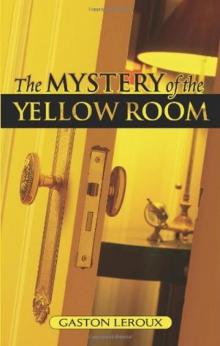 The Mystery of the Yellow Room
The Mystery of the Yellow Room The Secret of the Night
The Secret of the Night In Letters of Fire
In Letters of Fire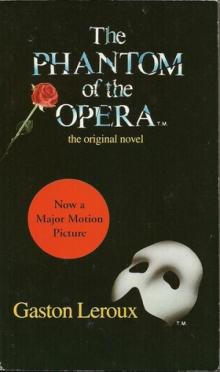 The Phantom of the Opera
The Phantom of the Opera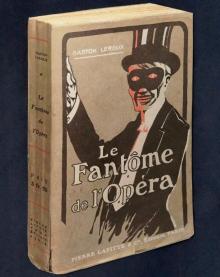 Fantôme de l'Opéra. English
Fantôme de l'Opéra. English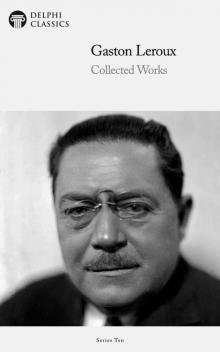 Collected Works of Gaston Leroux
Collected Works of Gaston Leroux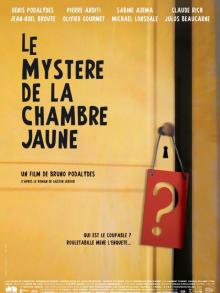 Le mystère de la chambre jaune. English
Le mystère de la chambre jaune. English Cheri-Bibi: The Stage Play
Cheri-Bibi: The Stage Play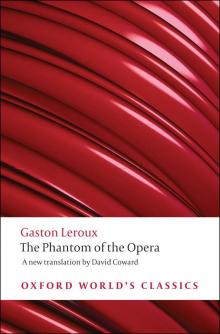 The Phantom of the Opera (Oxford World's Classics)
The Phantom of the Opera (Oxford World's Classics)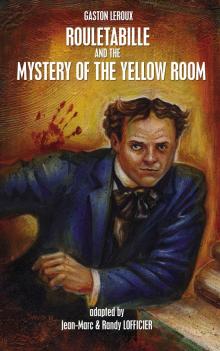 Rouletabille and the Mystery of the Yellow Room
Rouletabille and the Mystery of the Yellow Room The Perfume of the Lady in Black
The Perfume of the Lady in Black The Bloody Doll
The Bloody Doll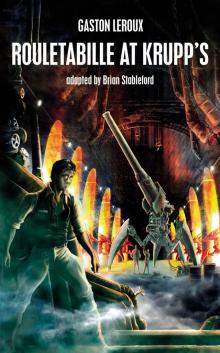 Rouletabille at Krupp's
Rouletabille at Krupp's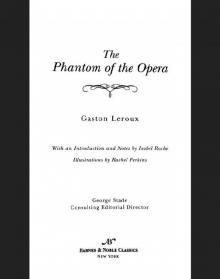 Phantom of the Opera (Barnes & Noble Classics Series)
Phantom of the Opera (Barnes & Noble Classics Series)